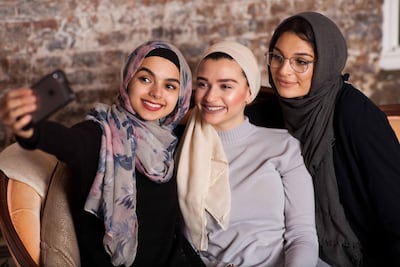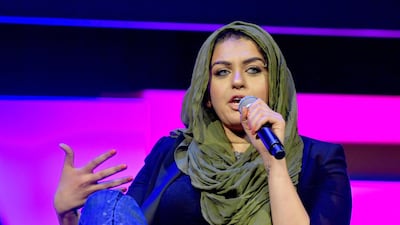The anti-Muslim rhetoric may be worse now than it has ever been in recent times. That's the view of Amani Al Khatahtbeh, founder of MuslimGirl.com, who used a recent appearance in Abu Dhabi to speak out about the dangerous environment for Muslims in America.
"Numerous civil-rights organisations and think tanks in the US have determined that today's political climate is even more anti-Muslim than it was immediately after 9/11," the American author tells The National after participating in a panel at the recent Culture Summit in Abu Dhabi.
10 years of MuslimGirl.com
"Things are only getting worse and especially for a Muslim woman, a veiled Muslim woman, one of the most visible religious minorities in the country.
They too have become increasingly targeted. We’ve seen a steady increase in hate crimes against Muslim women, unfortunately since he who shall not be named [Donald Trump] was elected.”
Al Khatahtbeh spoke frankly about the challenges facing Muslims worldwide. She started MuslimGirl.com in her bedroom when she was 17 in order to contest how Muslim women were represented in the media in the US. "There should be no conversation about Muslim women without Muslim women," she said in a recent fundraising video for the site as it celebrated its 10th anniversary.
Many of the posts are a wry Gawker-style mix of beauty, fashion, politics and lifestyle, framing issues from the perspective of young Muslim women. A "Let's Help Pam Geller draw a Muhammad" segment responded to the right-wing political commentator Pamela Geller's attempt to provoke Muslims by holding a cartoon contest for images of the Prophet Mohammed; Muslim Girl asked passersby to sketch pictures of people they knew named Mohammed. Two videos called 100 Years of Hijab Fashion show in elapsed time all the different styles of hijab women have worn over the years in different countries, from Egypt to Angola.
The site also responds to the political climate, banning mention of President Trump's name. Al Khatahtbeh opts for the Voldemort-like "he who shall not be named", instead. And three years ago, the site was motivated to publish a safety manual for Muslim women who feel under threat, with tips such as keeping phones charged in case one needs to record a video, or taking care to enter and exit mosques in groups. "We have never before felt as pressing a need to publish something like that as we have in recent years," she says. "Not even our schools are a safe space for people of these marginalised backgrounds. This does not go just for Muslims but for a lot of different minorities on the short end of the stick when it comes to the kind of rhetoric that is socially acceptable right now."
Getting worse
Figures for 2017 released by the FBI in November last year show a nearly 23 per cent increase in religion-related hate crimes in America. The US think tank, Institute for Social Policy and Understanding, which studies issues around American Muslims, reported in 2017 that the religious group was the most likely to express fear for their personal safety, with nearly 38 per cent agreeing.
Ilhan Omar, one of the first two Muslim women to be elected to the US House of Representatives, has been embroiled in a number of public firestorms lately, which for many, exemplify the current climate of Islamophobia.
Al Khatahtbeh calls Omar a "very good friend of mine" and the Minnesota representative has been a frequent subject on MuslimGirl.com, most recently taking part in discussion for Muslim Women's Day in March.

“America’s conversation around Israeli politics and Palestinian human rights has had the lid on it for decades, and to see this eruption of discussion as a result of the conversations that Ilhan has been having, like on MuslimGirl.com, is something that we’ve never had before,” says Al Khatahtbeh. “Just to be able to crack open the space to have that dialogue alone is a tremendous milestone for progress.”
Successful collaborations
MuslimGirl.com itself is growing from being an operation based in Al Khatahtbeh's bedroom in the suburban New Jersey town of East Brunswick, 10 years ago, to a media company with sponsorship deals and offline ideas. The site recently partnered with the Orly beauty company to make nail varnish that is air and moisture permeable, for those Muslim women who believe nail polish creates a barrier during the ablutions before prayers.
The company sold out the entire capsule collection on pre-order in the announcement week, Al Khatahtbeh says “it is a testament to the fact that there’s a bias against us, and for us”.
In 2017, Al Khatahtbeh worked with Getty to produce a new cache of stock images of Muslim women. The existing imagery, Al Khatahtbeh argues, presented them as "a wall of faceless, veiled women looking very oppressed, depressed.
"We thought we needed to change that so we teamed up with Getty to create a stock photo collection by and for Muslim women. It hires Muslim women photographers and employs female models who are actually Muslim in real life. Those who wear the headscarf in real life wear them in the photos, those who don't, don't. It depicts Muslim women who are just like us doing the things we do."
Al Khatahtbeh was at the Culture Summit to talk about how technology has helped shape new discourses in the media. "This just started with me in my bedroom," she says. "The personal is political today."


